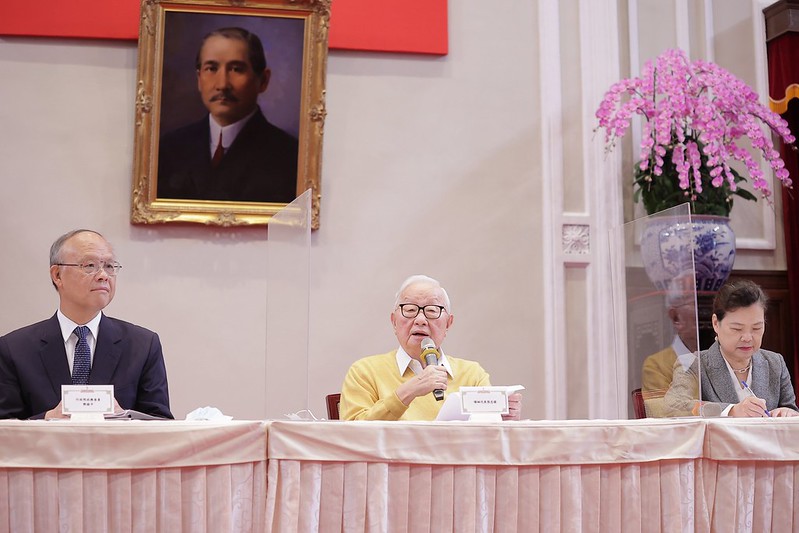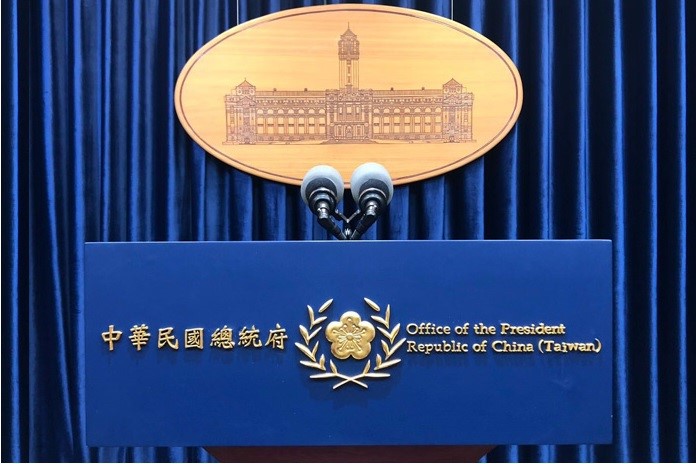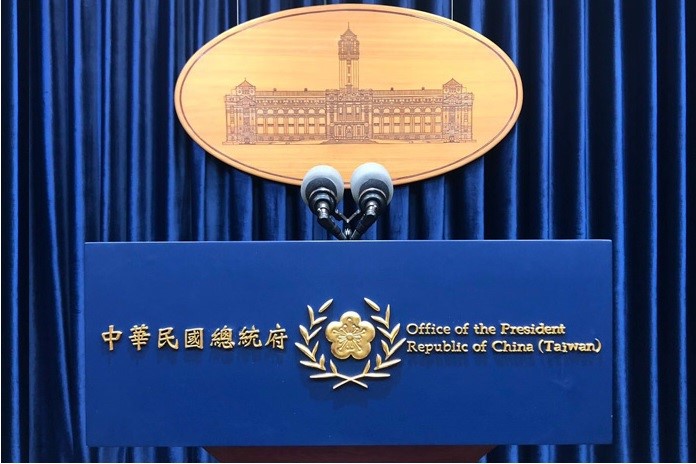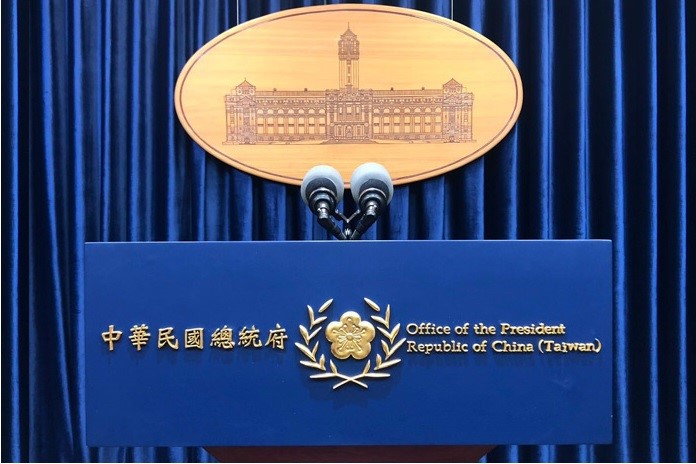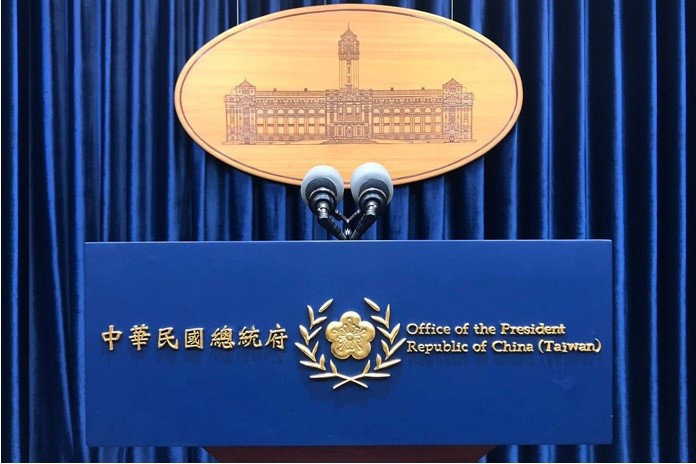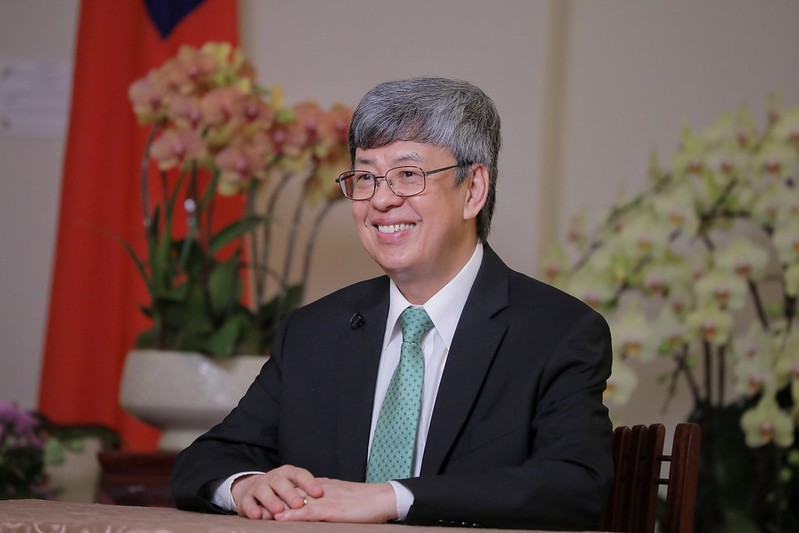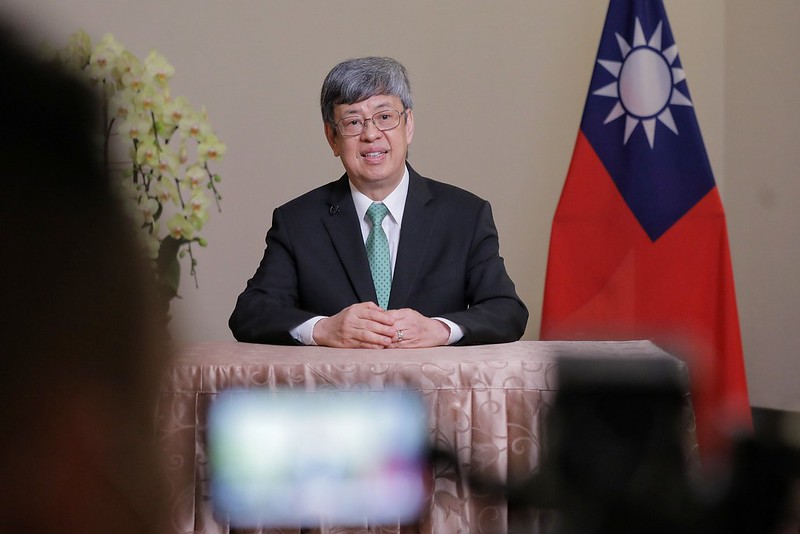News & activities
 News releases
News releases
At 9 AM on May 7 PST (12 AM on May 8 Taipei time), Vice President Chen Chien-jen delivered a speech entitled Taiwan and the COVID-19 Pandemic: Lessons for the World at a videoconference hosted by the Hoover Institution at Stanford University.
Delivered via video, the vice president's keynote speech pointed out that the three major principles underpinning our current measures for countering COVID-19 were established following the SARS outbreak: prudent action, rapid response, and early deployment. He also emphasized that a critical element of the Taiwan Model is transparency, ensuring that the general public has open access to COVID-19 information. The vice president believes that Taiwan's participation in the World Health Assembly (WHA) would help the world address COVID-19, and called on the World Health Organization to grant Taiwan full participation in all WHO meetings, mechanisms, and activities, without political preconditions, so that Taiwan can share its remarkable performance and experience with the international community.
Following is a transcript of Vice President Chen's remarks, which he delivered in English:
Good morning, everyone. First of all, I would like to express my appreciation to the Hoover Institution, and Dr. Larry Diamond in particular, for organizing today's event and for inviting me to take part.
Dr. Diamond is a leading scholar in the field of democracy studies, and very familiar with Taiwan's transition into a vibrant democracy. I think this is the one of the reasons he organized today's event, as Taiwan's experience of fighting this global pandemic as a democratic country is well worth sharing.
Having spent several years at Johns Hopkins University pursuing my doctor of science in epidemiology, I have a deep and personal connection to the US that has profoundly influenced my professional career. In Taiwan, many public health officials and experts trained or studied in the US. The close bonds that Taiwan and US health agencies and experts have long enjoyed are an important element in the Taiwan-US partnership.
As of April 30, there were over 3.2 million confirmed cases of COVID-19 globally, and over 220,000 deaths. Life and work have been disrupted in an unprecedented manner by this pandemic, and the world's economy has taken a heavy hit.
In this globalized world, Taiwan has not been spared either. However, despite our proximity to the origin of COVID-19, the disease has not inflicted the same damage in Taiwan as seen in China and many other countries. This is because Taiwan has been prepared for this for 17 years. We learned the hard way from the SARS outbreak in 2003.
When SARS hit Taiwan, I was head of the Department of Health, now the Ministry of Health and Welfare. SARS revealed many of the flaws and inadequacies in our epidemic prevention system. After the outbreak abated, we started to rebuild the system.
We reviewed and revised the Communicable Disease Control Act and other relevant regulations. During an epidemic, the government is now authorized to designate medical care institutions to function as responding hospitals or isolation hospitals. We can also implement measures to prevent hospital infection. This includes designating separate entrances and exits for inpatients, outpatients, and ER patients. We also formulated standard procedures for surveillance and reporting of communicable diseases, and optimized our border quarantine protocols.
We strengthened our home isolation or quarantine procedure for contacts of confirmed cases or passengers from epidemic areas, and stipulated that the relevant authorities should ensure we always have sufficient critical medical supplies at hand. Disseminating incorrect information about an outbreak is also a finable offence. And SARS made us realize that our Centers for Disease Control was not as well staffed as it could have been, prompting us to recruit even more doctors specializing in infectious diseases.
SARS also prompted us to establish our first multi-specialized team for epidemic prevention. We also created the Office of International Cooperation within the Department of Health. The office engages in international public health cooperation and facilitates information sharing, allowing us to better contribute to the international community.
The purpose of this systematic overhaul was to achieve transparency, and promote information sharing and international cooperation. This made Taiwan better prepared to cope with today's pandemic, 17 years later.
The three major principles underpinning our current measures for countering COVID-19 were mainly established after SARS. They are prudent action, rapid response, and early deployment.
First, prudent action. It is important to monitor emerging infectious diseases, especially in the region where we are located, near China. On December 31 last year, Taiwan CDC officials noted a post online with a proclamation issued by the local authorities in Wuhan, China, detailing a number of suspicious cases of an illness with symptoms similar to SARS. After careful deliberation, we informed WHO that patients with this illness had been isolated for treatment in Wuhan. This was sent via email through the International Health Regulations mechanism.
Second, rapid response. On December 31, we also implemented on-board quarantine measures for all passengers flying into Taiwan from Wuhan, and activated a series of other preparatory measures. Shortly thereafter, we also established a task force, led by the Taiwan CDC, to monitor the situation, and sent two experts to Wuhan to conduct on-site investigations.
Third, early deployment. On January 21, the same day that our first COVID-19 patient arrived in Taiwan, our government activated the Central Epidemic Command Center—CECC—and began to implement a range of preemptive measures. This exemplifies our whole-of-government approach. We also enhanced border control procedures to identify imported cases. All travelers entering Taiwan were screened properly. Since March 19, 14-day home quarantine is mandatory for all passengers. Close contacts of confirmed cases are also placed under home isolation. After 14 days, all of them have to undergo another 7 days of self-health management.
In addition, an adequate supply of PPE has been critical. We experienced a serious shortage of N95 masks during the SARS outbreak. This time, we knew we needed to increase our production capacity for masks, and even implement a rationing system if necessary. We can now produce more than 15 million masks a day, with plans to eventually produce 20 million masks a day.
Among all of the measures we adopted, I would like to point out a critical element of the Taiwan Model: transparency. From the very beginning of the pandemic, the Taiwanese government has spared no effort in ensuring that the general public has open access to COVID-19 information.
The CECC has held daily press briefings since January. During these events, the Minister of Health and Welfare and his team share the latest numbers of confirmed cases. They also explain their approach to preventing the spread of COVID-19 and related policy decisions. These briefings, in turn, generate accurate news across a broad spectrum of media outlets.
By being as transparent as possible from day one, the CECC quickly established its authority and earned the trust of the public. This trust has had a stabilizing influence on society, encouraging citizens to follow government guidance and rules, and making the public less vulnerable to disinformation campaigns. This has created a virtuous cycle: the more public trust that exists, the more people are willing to cooperate, raising our chances of overcoming this challenge.
There is no doubt this can only happen in a democratic society where the government is held accountable and must respond to people's demands. This transparency, both in spirit and in practice, stands in sharp contrast to authoritarian China, which has tightly controlled information about COVID-19 right from the start. China has attempted to cover things up by eliminating important scientific evidence, and delayed sharing information with the international community. It even silenced whistleblowers from exposing the real situation within China.
This pandemic has vividly demonstrated that the major distinction between the Taiwan Model and the Chinese Communist model lies in transparency and honesty. The Chinese Communist Party's rigid system sows seeds of distrust between the government and its people; in democratic Taiwan, trust is the natural byproduct of transparency and openness.
In the fight against this global pandemic, no one can or should be left behind. We can only win this battle through close information sharing and collaboration.
Taiwan once stood alone during the SARS pandemic, and is now excluded from the World Health Organization. Yet our painful experience taught us that no country should face a pandemic alone. International cooperation is the only way to fight a global outbreak.
This time around, the Taiwan Model has earned worldwide recognition. We are more than happy to share our knowledge, experience, and expertise with the international community. Taiwan can help, and Taiwan is helping.
Let me start with the United States, a true friend and key partner. In dealing with public health emergencies, Taiwan and the US have long enjoyed a good working partnership. During the SARS outbreak, WHO declined to send experts to Taiwan to investigate, and we were excluded from the international response mechanism. Fortunately, the US helped Taiwan through its CDC, enhancing our capacity to deal with the situation.
Turning to the COVID-19 response, in mid-March Taiwan and the US issued a joint statement announcing efforts to curb the disease by enhancing cooperation in several areas.
One important platform has been the Taiwan-US Global Cooperation and Training Framework (GCTF). Since the inception of the GCTF in 2015, Taiwan and the US have joined hands to enhance capacity building among regional partners, helping them cope with challenges emerging across the Indo-Pacific. Public health has been a priority, and we have held numerous GCTF workshops sharing expertise and best practices. Just a week ago, we jointly organized a virtual GCTF workshop on combatting COVID-19 disinformation. There will be more workshops like this in the coming months.
Other than actively sharing our experience and expertise, Taiwan has also donated face masks and medical equipment to countries around the world, including the US, to support frontline medical workers. As of April 30, we had donated over 3.5 million face masks to the US, and 17 million masks worldwide. We have also donated thermal imaging cameras to our diplomatic allies.
Elsewhere, Taiwan's top research institute, Academia Sinica, has held videoconferences with EU officials and scientific research institutions in the Czech Republic and Turkey to discuss possible collaboration. Taiwanese hospitals are also using videoconferencing to share our disease prevention experience and techniques with countries that need help.
In times of crisis, countries around the globe must unite and work together to overcome challenges. We will continue to help the international community by providing face masks, pharmaceuticals, and technologies. We firmly believe that in a globalized world, we will never be safe unless other countries can bring outbreaks under control. For this reason, Taiwan must do its part to stop the spread of this pandemic.
For the sake of global unity and international cooperation, Taiwan's participation and involvement in the World Health Organization, the world's most important public health agency, should no longer be blocked. Excluding Taiwan from the WHO system not only ignores the rights and interests of Taiwan's 23 million people, but also increases the risk of a potential gap in the global health and disease prevention network.
The WHO Secretariat says it has maintained regular technical exchanges with Taiwan's health authorities over the years. However, the truth is we have great difficulty in accessing technical, working-level meetings with WHO experts. From 2009 to 2019, we applied to attend 187 meetings, but were only invited to 57. In other words, 70 percent of Taiwan's requests to attend technical meetings were turned down. This lack of timely information exchange has become a hidden risk in the global public health system.
Taiwan's participation should not be seen as a political issue; this is about people's lives, public health, and human rights. Thanks to strong and active advocacy from such friends as the United States, like-minded countries, and our diplomatic allies, we are glad that WHO has finally reached out to us and set up means of exchanging information about COVID-19 via teleconferencing. But this is a fragmented measure, and far from ideal.
I believe Taiwan's participation in the WHA would help the world address COVID-19. We call on WHO to stand up for its self-declared ideals of professionalism and neutrality by inviting Taiwan to attend the WHA as an observer, and grant Taiwan full participation in all WHO meetings, mechanisms, and activities, without political preconditions.
It has become clear to the world that the Taiwan Model in fighting the COVID-19 outbreak has been effective, and that our story needs to be heard. Taiwan has responded to COVID-19 extraordinarily well. By sharing our experience, we can help the international community better prepare for the next pandemic.
Nobody knows when we can put this pandemic behind us, or when the next outbreak will occur. The most important thing is that all countries learn lessons, and adopt measures in preparation for future outbreaks, just as Taiwan did after SARS in 2003.
We will continue to share the Taiwan Model and do our best to make contributions as a responsible member of the global health community. Together we can defeat this virus, which knows no boundaries, and cares nothing for politics.
The videoconference was moderated by Professor Larry Diamond, Senior Fellow at the Hoover Institution, Stanford University, and hosted by Dr. Glenn D. Tiffert, Visiting Fellow at the Hoover Institution. In addition to the vice president's keynote speech, Director Jason Wang (王智弘) of the Center for Policy, Outcomes and Prevention, Stanford University, Professor Chang Wen-Chen (張文貞) of the Department of Law, National Taiwan University, Legislator Fan Yun (范雲), Associate Professor of the Department of Sociology of National Taiwan University, and Dr. Lanhee Chen (陳仁宜), Fellow at the Hoover Institution and recently often interviewed by American mainstream media regarding Taiwan's successful epidemic prevention all held discussions and took online Q and A focusing on public health, rule of law, civil society, and lessons for the world. The closing addresses were delivered by Dr. Mung Chiang (蔣濛), US Secretary of State's Science and Technology Adviser, and Principal Deputy Assistant Secretary Jonathan Moore of the Bureau of Oceans and International Environmental and Scientific Affairs under the State Department, stressing the importance of international cooperation.
